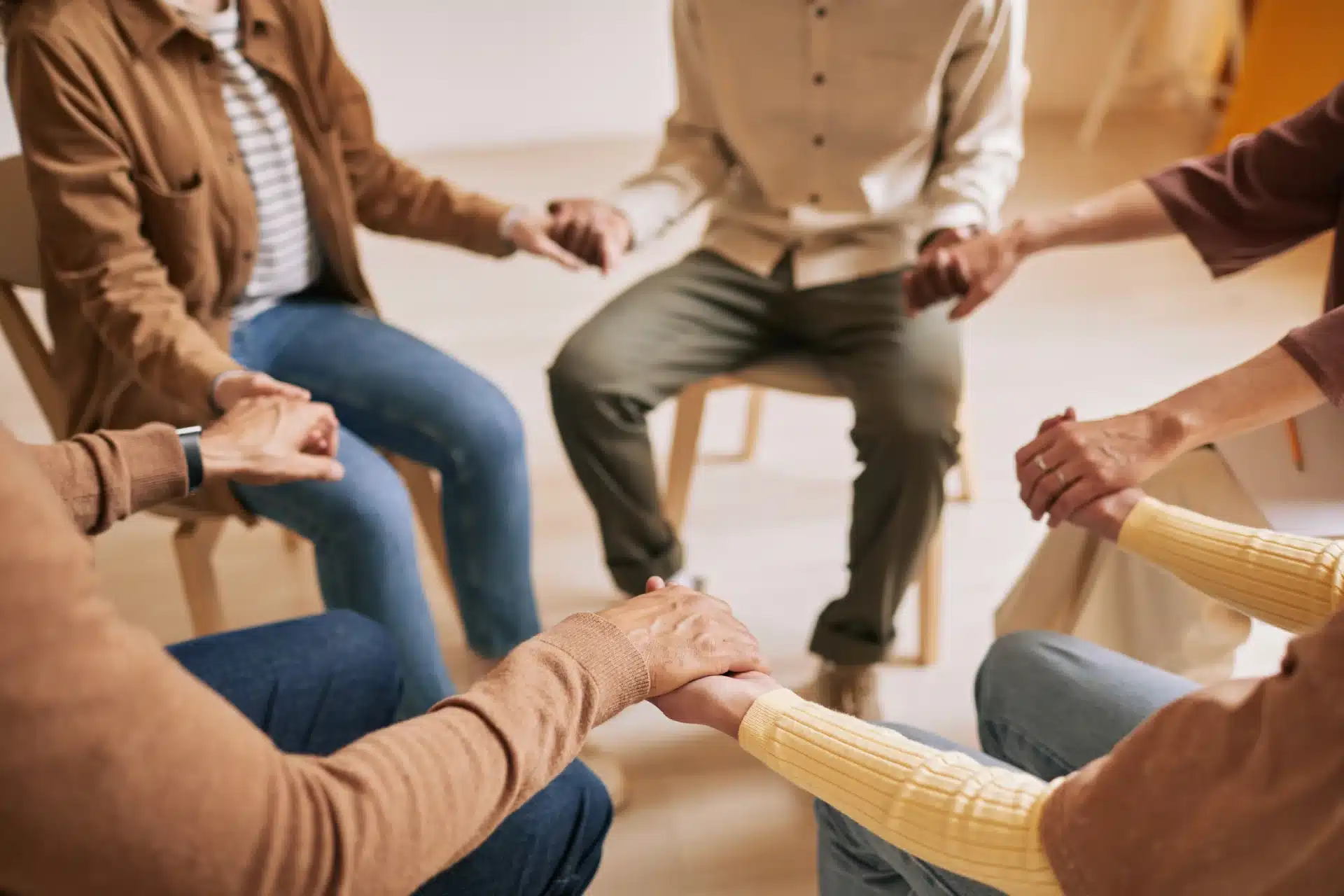
Drug Addiction Treatment
Break free from the cycle of addiction and reclaim control of your life.
Compassionate Drug Addiction Treatment
At our substance abuse treatment centers, we create a supportive environment where you can make real progress. Our programs are designed to help you break the cycle of addiction, rebuild your life, and regain control over your future. With our help, you’ll develop the tools you need to manage triggers, prevent relapse, and live free from the hold of drugs.
Personalized Drug Addiction Treatment Plans
Our approach to drug addiction rehab focuses on creating personalized plans that match your specific needs, using proven strategies that work best for you. We treat the whole person, addressing the physical, emotional, and psychological effects of drug abuse. Our goal is to provide lasting recovery and empower you with the skills needed to stay drug-free.

Treatment for Drug Addiction in Any Form
At The Meadows, we provide expert care for individuals struggling with a wide range of drug addictions.
Our individualized, trauma-focused approach ensures that we address the underlying root of the addiction, providing a path to long-term and lasting recovery. No matter the substance, our goal is to guide you toward a healthier, more fulfilling life.
Ready to get started? Call today:
Our comprehensive drug treatment programs address the unique challenges associated with each type of substance, including:
- Prescription Drugs: Opioids, benzodiazepines, and other medications are often misused.
- Illicit Drugs: Substances like cocaine, heroin, and methamphetamine.
- Stimulants: Drugs such as Adderall or Ritalin, are commonly used to enhance performance or energy.
- Hallucinogens: LSD, MDMA, and other substances that alter perception and mood.
- Marijuana: For individuals who have developed a dependency or use it to cope with underlying issues.
Recognizing Drug Addiction Signs and Symptoms
Recognizing the signs of drug addiction can be the first step toward recovery. Symptoms may vary depending on the substance but often include:
- Physical Symptoms:
- Changes in appetite or weight
- Sleep disturbances, such as insomnia or excessive sleeping
- Slurred speech, impaired coordination, or unusual energy levels
- Withdrawal symptoms like sweating, shaking, nausea, or anxiety when not using
- Behavioral Symptoms:
- Neglecting responsibilities at work, school, or home
- Secretive or deceitful behavior about activities or whereabouts
- Increased tolerance, requiring more of the substance to achieve the same effect
- Spending excessive time obtaining, using, or recovering from the substance
- Psychological Symptoms:
- Mood swings, irritability, or heightened anxiety
- Feelings of hopelessness, guilt, or depression
- Paranoia or hallucinations in severe cases
If you or someone you love is showing these signs of drug addiction, it’s time to seek help. Early intervention can prevent further harm and lead to a successful recovery journey.
Our Drug Addiction Treatment Centers
Inpatient
Our inpatient drug addiction treatment centers offer structured, daily support in a safe, focused environment. This option is ideal for those needing intensive care to begin their recovery.
Outpatient
Outpatient programs offer flexible care that fits your life, providing expert support to help you stay on track while managing daily responsibilities like work, school, and family.
Workshops
Workshops are great for those who’ve finished inpatient treatment and want to keep building on their progress. These short, focused programs help you tackle specific challenges and stay on track.
Our Inpatient & Residential Emotional Trauma Centers
Our Outpatient Trauma Treatment Center Locations
Why Choose the Meadows for Drug Addiction Treatment?
At The Meadows, we recognize that addiction is not just a physical dependency—it’s deeply connected to emotional trauma and mental health struggles. Our transformative approach includes:
Trauma-Focused Care
We address the root causes of addiction by helping you heal from past trauma through evidence-based therapies and our proprietary Meadows Model. Read our clinical outcomes.
Comprehensive, Whole-Person Treatment
We combine medical care, emotional support, and psychological therapies to treat addiction’s full impact on your life.
Expert Team
Our team includes experienced medical professionals, therapists, and recovery specialists committed to guiding you every step of the way. Meet our Senior Fellows.
Supportive Environment
Nestled in a serene setting, our facilities are designed to promote healing and self-discovery, offering the privacy and comfort needed for recovery.
How We Treat Drug Addiction
Brain Center
Our Brain Center uses advanced tools to improve brain function, which is key to overcoming addiction. These tools help reduce cravings and enhance your ability to manage triggers, supporting your recovery every step of the way.
Types of Therapy
Each drug addiction treatment plan includes various therapies that work together to address your unique challenges. This combined approach helps you heal physically, mentally, and emotionally, giving you the confidence to stay on track.
Meadows Model
At our drug addiction treatment centers, we use the Meadows Model to uncover the deeper emotional and psychological patterns that fuel addiction. This approach helps you break free from harmful cycles and establish a strong foundation for long-term recovery.
I reached out as my daughter was feeling lost. The staff were empathetic and understanding, keeping me informed throughout. After 4-6 weeks, I saw a significant improvement in her mood. She’s now more optimistic than ever, and I’m so grateful for this center.
Michelle
Parent of MBH Alumni

Traveling for Care?
People from all over choose The Meadows for expert care in trauma, addiction, and mental health, a private environment, and extraordinary recovery outcomes. We ensure every step of your journey is supported so you can focus fully on healing.

Reclaim Your Life from Addiction
Take the first step toward lasting recovery. Contact our team today to learn more about how we can help.
-
Drug Addiction Treatment FAQs
What causes drug addiction?
Drug addiction can result from a variety of factors, including genetics, past trauma, mental health conditions, and environmental influences. At The Meadows, we understand that addiction is rarely about the substance alone. Our trauma-focused approach identifies and addresses the underlying causes of addiction, helping you heal emotionally, mentally, and physically for long-term recovery and a happier life.
What are the signs of drug addiction?
Common signs include needing more to get the same effect, withdrawal symptoms, cravings, using more or longer than intended, failed attempts to cut down, spending lots of time obtaining/using/recovering, neglecting work or relationships, risky use, and continuing despite health or legal problems. If these sound familiar, The Meadows can provide a confidential assessment to help determine the right level of care.
How to overcome drug addiction?
Recovery is possible with the right support: most people do best with a personalized plan that can include medically supervised detox, evidence-based therapy, medications when appropriate, peer support, family involvement, and a relapse-prevention aftercare plan. Start by calling The Meadows for a confidential assessment to match you with the right level of care; if you’re in immediate danger or thinking of self-harm, call 988 or your local emergency number now.
What is a residential treatment program for drug addiction?
A residential treatment program, also called inpatient treatment, is live-in, 24/7 care at a licensed facility where you follow a structured daily schedule of evidence-based therapies, medical support (including detox when needed), and peer/community support without everyday triggers. At The Meadows, residential care typically lasts weeks to months and includes trauma-informed treatment, family programming, and a personalized plan for lasting recovery.
What medications are used to treat drug addiction?
It depends on the substance. Common options include buprenorphine, methadone, or naltrexone for opioid use disorder; naltrexone, acamprosate, or disulfiram for alcohol use disorder; and nicotine replacement, bupropion, or varenicline for tobacco use. There are currently no FDA-approved medications for stimulant use disorder, though behavioral therapies are recommended; a clinician can determine what’s appropriate for you.
Is alcohol a drug?
Yes. Alcohol is a psychoactive drug and central nervous system depressant that can cause dependence, tolerance, and withdrawal. It is treated as a substance use disorder with evidence-based therapies and medical support when needed. Read about our alcohol addiction treatment.
How can I help a loved one struggling with a drug addiction?
Helping a loved one with drug addiction starts with recognizing the signs, approaching them with empathy, and encouraging professional treatment. At The Meadows, we involve families in the recovery process through education and therapy, helping rebuild trust and create a support system that fosters healing. Our team is here to guide you and your loved one every step of the way. Connect with our team to get started.
Why is The Meadows an effective choice for drug addiction treatment?
The Meadows stands out for its trauma-focused approach, addressing not just the addiction but also the underlying emotional, mental, and physical issues that fuel it. Our programs are led by experienced clinicians and utilize evidence-based therapies, including our proprietary Meadows Model, which helps uncover and heal the deeper patterns driving addiction. With access to state-of-the-art resources like our Brain Center and innovative therapies, we provide a comprehensive foundation for lasting recovery.
What are the benefits of a 45-day drug abuse treatment program at The Meadows?
The Meadows’ 45-day treatment program offers extended time to address both the symptoms and root causes of addiction thoroughly. This additional time allows for:
- Healing Root Issues: A longer duration enables us to delve into complex trauma and co-occurring conditions that may contribute to addiction.
- Stronger Skill Development: Clients have more time to learn, practice, and reinforce relapse prevention strategies and coping skills.
- Sustainable Recovery: Research shows that longer treatment durations significantly improve long-term recovery outcomes.
- Holistic Transformation: The extended program includes therapy, wellness activities, and family involvement, ensuring that all aspects of recovery are addressed.
While treatment plans and timelines are flexible and specific to an individual’s circumstances, with 45 days at The Meadows, you’ll have the opportunity to create lasting change and rebuild a healthier, more fulfilling life.